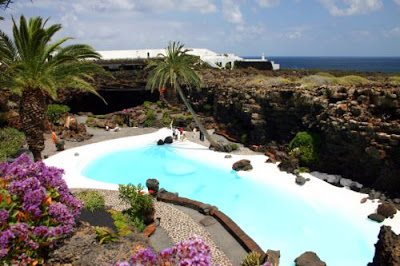The Canary Islands have something of a reputation in the
Lanzarote was first conquered by the Spanish crown in the early 1400´s – rapidly emerging as in important strategic staging post in the nascent empire.
The island has been welcoming tourists since the 1970´s. But despite Lanzarote´s undoubted popularity as a holiday destination, welcoming over 1.5 million tourists in 2008, the island still remains surprisingly undeveloped. Especially in comparison to larger Canarian cousins such as Gran Canaria and

Hail Cesar
This can largely be attributed to the work and influence of Cesar Manrique – an artist who was born on Lanzarote and went on to head up the Spanish surrealist movement in the 1950´s. Manrique was deeply in love with his birthplace – seeing great beauty in Lanzarote´s eerie volcanic landscapes. And was working in
Fearing that the island could become buried beneath a sea of hotels and golf courses Manrique returned to Lanzarote. And with the help of the island governor and close family friend Pepin Ramirez campaigned for the controlled development of tourism.
As a result there are no high rise buildings or ad hoardings on Lanzarote. The three main tourist resorts are all well contained. And artistic sculptures and wind toys adorn roundabouts and public spaces.
Manrique also created a series of alternative tourist attractions. Eschewing the conventional route of theme parks to construct sites such as the Jameos del Agua.
Thanks to Manrique Lanzarote was declared a UNESCO protected biosphere in 1994. The first island in the world to be awarded this status.
Places To Stay
There´s a wide range of good quality accommodation options on the island. Hotels account for around 40% of all tourist beds. But many visitors prefer to book private rental accommodation. With apartments and villas in Lanzarote proving especially popular in recent years.
Getting There
The island is serviced by the one international airport at Arrecife. With flights to Lanzarote available from all major

